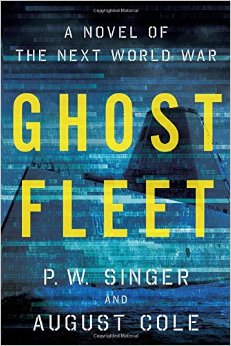A Bit of Summer Reading
Tuesday, July 28th, 2015[by J. Scott Shipman]
Dead Wake, The Last Crossing of the Lusitania, by Erik Larson
Straight to Hell, True Tales of Deviance, Debauchery and Billion Dollar Deals, by John Lefevre
Ghost Fleet, A Novel of The Next Work War, by P.W. Singer & August Cole
The Fate of a Man, by Mikhail Sholokhov
BACH, Music in the Castle of Heaven, by Sir John Eliot Gardiner
Seeing Calvin Coolidge in a Dream, by John Derbyshire
The summer of 2015 for me is becoming memorable for the diversity of the books making it into my queue through unexpected circumstances. Larson’s Dead Wake was an surprise gift from a neighbor familiar with my professional pursuits. I read “Wake” in two sittings and it is superb. Larson puts faces on the victims, and highlights the politics from both sides of the Atlantic, to include the German U-boat commander responsible for the sinking. This tragedy reads like a novel and is wicked good.
Last year my son turned me on to the feed of @GSElevator on Twitter. I would have never read this book had I not become a fan of Mr. Lefevre’s decidedly politically incorrect sense of humor. With over 700k followers on Twitter he created an instant potential market and I bit. Straight to Hell is an entertaining irreverent look at the top of the banking profession, and is not for the faint of heart—and very funny.
Ghost Fleet is one of the most anticipated techno-thrillers in recent memory. Singer and Cole have spun a good yarn of how a future world war between the USA and China/Russia. While the book is a page turner, the authors thankfully sourced their technology assertions in 22 pages of notes! A great resource for a very good book. One could quibble over lack of character development, but this book is driven more by technological wizardry and is a fun and instructive read.
Fate of Man was recommended either at a blog or in blog comments—I don’t remember. This tiny but poignant book (it is more a bound short story) provides the reader with a glimpse of the hardships and sacrifices in Russia post WWII. Torture and suffering on a scale foreign to 99.9% of those living in the modern Western world.
BACH was a birthday gift, and I would like to report I have finished Gardiner’s masterpiece, but that may take some time (I’m at page 330). Gardiner shares insights on JS Bach’s life and music, and while I have over forty Bach recordings in my iTunes account, this lovely book is introducing a massive body of Bach’s cantata work—over 200 and I’m unfamiliar with most. My method has been to read Gardiner’s description of the piece, then find a recording on YouTube. Unfortunately, Gardiner does not discuss one of my all-time favorite Bach Cantatas Ascension Oratorio BWV-11 (the last five minutes are simply divine).
Finally, the Calvin Coolidge book came to me via CDR Salamander in a Facebook thread. As a fan of Coolidge and Derbyshire, I grabbed a copy and I’m glad I did. Derbyshire has written a sweet and insightful story of love, betrayal, and redemption, all the while providing the reader a frightening description of China’s cultural revolution.
My China study continues, adding Edward Rice’s Mao’s Way, along with CAPT Peter Haynes’ Towards a New Maritime Strategy: American Naval Thinking on the Post-Cold War Era—-both are thus far very good. Also thanks to a friend, I recently spent some quality time with the late master naval strategist, Herbert Rosinski’s The Development of Naval Thought. This is my third or fourth pass through a very good little book. If naval strategy holds any interest, this little book is not to be missed.
Are you reading any unusual titles?










